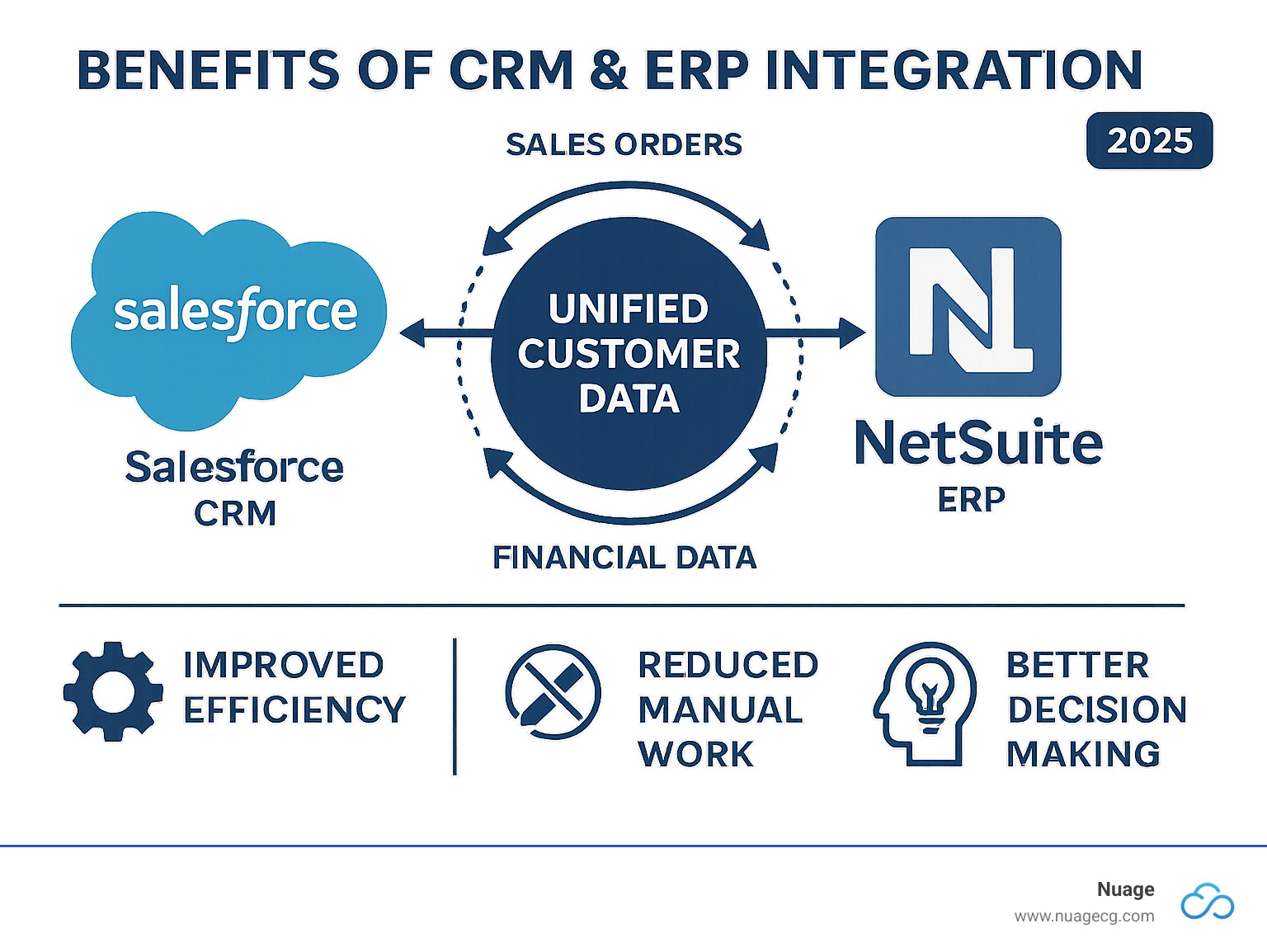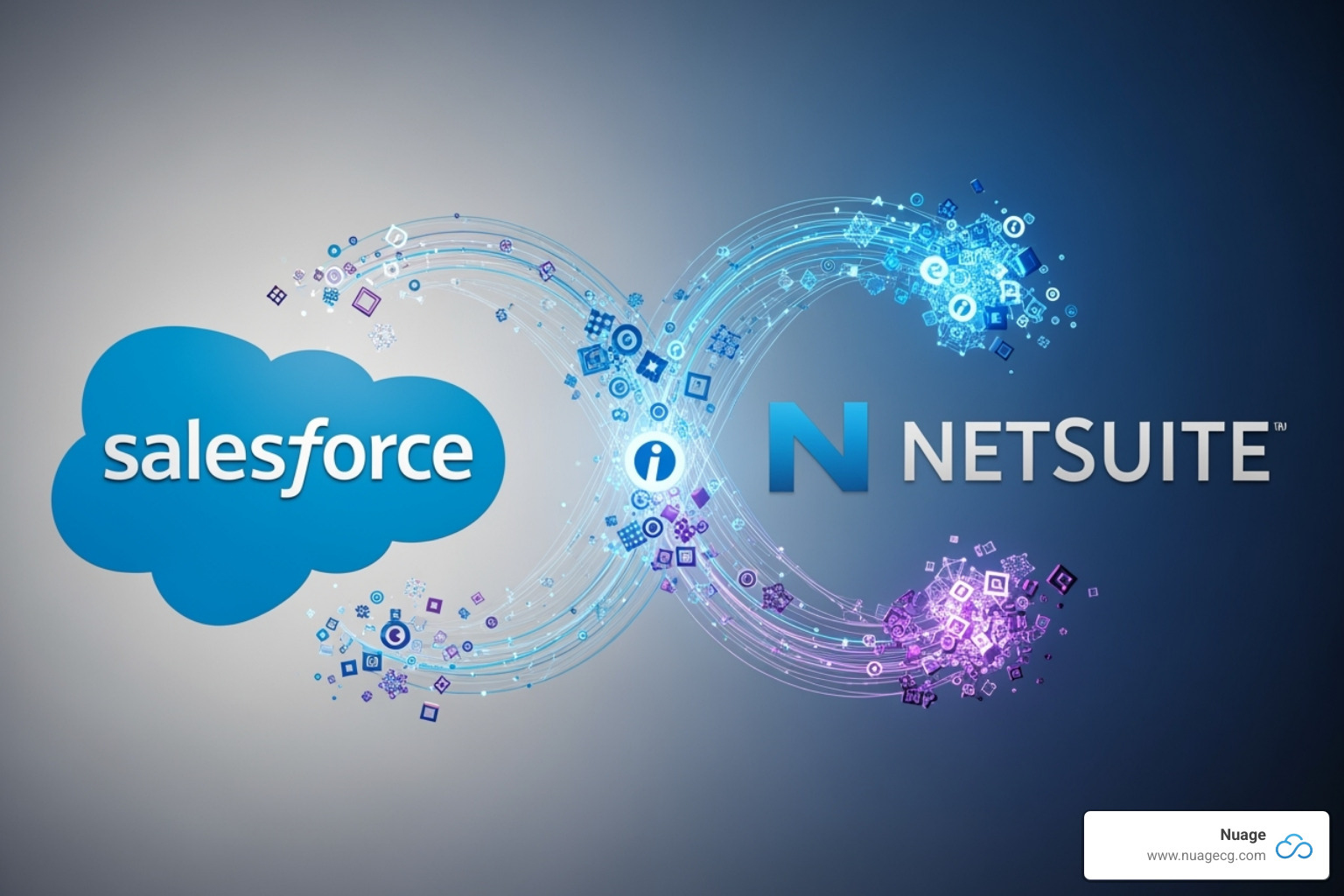Why Your Business Needs a Salesforce NetSuite Connector
A Salesforce Netsuite Connector is a software solution that enables seamless data flow between your Salesforce CRM and NetSuite ERP systems. It eliminates data silos and creates a single, unified business platform.
Key benefits of a Salesforce NetSuite connector:
- Real-time data sync: Customer, order, and financial data flows automatically between systems.
- Eliminate manual entry: Reduces errors and saves staff time (sales reps can spend over 40 hours monthly searching for data).
- 360-degree customer view: Sales teams see payment history, while finance teams access sales data.
- Streamlined order-to-cash: Orders flow from Salesforce opportunities to NetSuite fulfillment.
- Improved reporting: Consolidated data enables better business decisions.
The market demand for this level of integration is exploding. Businesses increasingly recognize that they struggle when their Salesforce CRM and NetSuite ERP systems don’t communicate effectively.
Without integration, your teams work in isolation. Sales can’t see payment status. Finance lacks visibility into the sales pipeline. Operations get order details too late. This leads to manual data entry errors, delayed decisions, and frustrated employees.
I’m Louis Balla, and I’ve spent over 15 years helping businesses transform through strategic NetSuite optimization and third-party integrations. My expertise in building salesforce netsuite connector solutions has shown me how the right integration eliminates the barriers that keep businesses from reaching their full potential.

Explore more about salesforce netsuite connector:
Why Connect Salesforce and NetSuite? The Power of a Unified View
When I talk to business leaders, a common story emerges. Their sales team in Salesforce can’t see if a customer has overdue payments. Their finance team in NetSuite doesn’t know about hot deals in the pipeline. Everyone’s working hard, but they’re working blind.

This is exactly why businesses need a salesforce netsuite connector. It’s not just about moving data; it’s about creating a clear, shared picture of every customer interaction, order, and financial transaction for the entire organization.
Imagine your sales rep instantly seeing a customer’s payment history and credit limit without leaving Salesforce. Or your finance team having real-time visibility into the sales pipeline for cash flow planning. This 360-degree customer view transforms how businesses operate.
Companies are realizing their order-to-cash process should flow seamlessly. With proper integration, a closed deal in Salesforce automatically becomes a sales order in NetSuite, inventory is allocated, and fulfillment begins—all without manual data re-entry. This ensures data accuracy and enables real-time reporting for informed decision-making.
Breaking Down Silos and Boosting Benefits
The most dramatic change after implementing a salesforce netsuite connector is the breakdown of departmental walls. Sales, finance, operations, and customer service begin to collaborate naturally because they share the same accurate, up-to-date information.
- Sales Team: Reps gain instant access to payment status, credit limits, and inventory levels within Salesforce. This eliminates hours of data hunting and allows them to focus on selling.
- Finance Team: Real-time access to the sales pipeline improves revenue planning, commission calculations, and cash flow management.
- Operations Team: Automated sales order flow from Salesforce to NetSuite accelerates fulfillment, reduces errors, and gets products to customers faster.
- Customer Service Team: With a complete view of order history and payment status, agents can resolve issues more effectively, improving the customer experience.
This integration delivers benefits that directly impact your bottom line. You get streamlined processes, minimized errors, and increased productivity. Most importantly, you build a scalable foundation for growth, where your systems can handle increasing transaction volumes without manual workarounds. With consolidated data for analytics, your reporting becomes a powerful tool for strategic decisions.
Learn more about maximizing your systems through our NetSuite ERP Integration expertise.
Understanding the Salesforce NetSuite Connector: How It Works
Think of a salesforce netsuite connector as a digital translator that works 24/7, ensuring your Salesforce CRM and NetSuite ERP systems speak the same language. At Nuage, we’ve built these digital bridges for hundreds of businesses, and when it works well, it feels like magic.

The technical foundation relies on APIs (Application Programming Interfaces), which allow software systems to communicate reliably. The connector leverages the robust APIs of both Salesforce and NetSuite to create seamless data flows.
Here’s how it works: The connector automatically transfers data based on predefined rules, enabling bi-directional synchronization. An update in Salesforce instantly appears in NetSuite, and vice versa. It also handles data mapping, matching fields between systems (e.g., “Customer Name” in Salesforce to “Company Name” in NetSuite). Most importantly, it provides real-time synchronization, so a closed deal is visible to your fulfillment team in minutes.
While NetSuite offers its own connector solutions, we often find that custom integration provides the flexibility our clients need. Your business is unique, and your integration should be too.
Data Synchronized by a Connector
A well-designed salesforce netsuite connector synchronizes a wide range of information to create a unified business ecosystem:
- Customer & Contact Data: Account details, billing/shipping addresses, and contact information stay aligned across both platforms.
- Product & Item Data: Sales reps always see current inventory levels, accurate pricing, and complete product descriptions from NetSuite.
- Sales & Financial Data: Sales orders automatically transfer from Salesforce to NetSuite. Invoices, payments, and credit memos sync back, giving sales teams visibility into customer financial status.
- Fulfillment Data: Order and fulfillment status updates are shared, so everyone has a clear view of the entire process from sale to delivery.
This synchronized data dramatically improves key business functions. Financial management becomes proactive, customer profile accuracy improves, and item and pricing consistency is guaranteed. Order management visibility transforms from a series of handoffs into a smooth, trackable process, creating a business that can scale with confidence.
For deeper technical insights, explore our guide on Salesforce and NetSuite Integration. And if you’re curious about the broader world of NetSuite Integration, we’ve got you covered.
Choosing Your Integration Path: Methods and Considerations
When starting a Salesforce-NetSuite integration, it’s crucial to understand that there isn’t a one-size-fits-all solution. At Nuage, we leverage over 20 years in digital change to help you determine the best solution for your unique needs, considering your technical resources, budget, and scalability goals.

The choice of integration method impacts cost, implementation time, flexibility, and maintenance. Our goal is to ensure you select a path that provides long-term value. For those looking to dive deeper, our blog on How to do NetSuite and Salesforce Integration using Salesforce API offers valuable insights.
Comparing Integration Approaches
Let’s explore the most common approaches for connecting Salesforce and NetSuite:
| Factor | Nuage’s Custom Integration | RESTlets (NetSuite Native) | Native Applications | iPaaS (Third-Party Platform) |
|---|---|---|---|---|
| Cost | Moderate to High | Moderate | Moderate to High | Low to Moderate |
| Implementation | Longest | Moderate | Short to Moderate | Shortest |
| Flexibility | Highest | High | Moderate | High |
| Maintenance | High | Moderate | Moderate | Low |
- Nuage’s Custom Integration: This involves building a bespoke solution customized precisely to your business processes. We use the powerful APIs of both platforms to create a highly optimized connection.
- Pros: Best flexibility and customization, perfectly fits complex logic, no dependency on third-party roadmaps. With Nuage, our experts can reduce project costs by replacing out-of-the-box solutions with outside-of-the-box thinking.
- Cons: Higher initial cost and longer implementation time; requires technical expertise for development and maintenance.
- RESTlets (NetSuite Native): This method uses NetSuite’s built-in server-side scripts to create custom web services for integration.
- Pros: Deep integration within the NetSuite environment, good control over data exposure, leverages existing NetSuite expertise.
- Cons: Requires technical knowledge of SuiteScript and REST principles; can be complex to develop and maintain.
- Native Applications: These are solutions built to embed seamlessly within both NetSuite and Salesforce, often emphasizing a “no middleware” approach.
- Pros: Often simpler to implement and administer, can provide a more unified user experience.
- Cons: May have customization limitations, dependent on the vendor’s feature roadmap, might not support all niche use cases.
- iPaaS (Integration Platform as a Service): This is a cloud-based platform providing pre-built connectors and low-code/no-code tools to integrate applications.
- Pros: Fastest implementation times, user-friendly interfaces, scalable, robust monitoring and error handling.
- Cons: Subscription costs, may offer less granular control for highly unique processes, reliance on the iPaaS vendor.
Key Features of a Salesforce NetSuite Connector
Regardless of the method, look for these key features in a salesforce netsuite connector:
- Bi-directional Sync: Ensures data consistency by reflecting changes made in either system in the other.
- Custom Field Mapping: Allows flexible mapping of your unique custom fields between Salesforce and NetSuite.
- Error Handling and Alerts: Provides automated alerts and detailed logs to quickly identify and resolve data transfer issues.
- Data Security: Adheres to high security standards, including encryption and secure API connections, to protect sensitive data.
- Performance and Reliability: Handles your data volume efficiently without slowing down either system, ensuring stability and uptime.
- Scalability: The solution should scale with your business, handling increasing data volumes without a complete overhaul.
Best Practices for a Seamless Salesforce-NetSuite Integration
Implementing a salesforce netsuite connector is a strategic project that impacts your entire business. At Nuage, our 20+ years in digital change have taught us that success depends on the people, processes, and planning surrounding the technology.
A successful integration requires a clear plan to minimize disruption and ensure everyone knows how to use the new, unified system. The following best practices form the foundation of a successful project:
- Clear Objectives: Before starting, define the specific business pains you are trying to solve. Clear goals guide every decision.
- Data Governance: Establish rules for data ownership and handling duplicates. This ensures your integrated system becomes a single source of truth.
- Phased Implementation: Start small to reduce risk. Begin with a core data set, like customer records, and gradually add more complex flows like sales orders and inventory.
- Comprehensive Testing: Use a sandbox environment to test all scenarios—happy paths, edge cases, and error handling—before going live.
- User Training: A technically perfect connector is useless if your team doesn’t know how to use it. Focus training on how the system makes their jobs easier.
- Ongoing Maintenance: Both Salesforce and NetSuite release updates. Your integration needs regular monitoring and maintenance to remain compatible and run smoothly.
Your Implementation Checklist
Follow this roadmap for integration success:
- Define scope and goals: Identify the exact data flows and processes that will deliver the biggest impact.
- Map data flows and fields: Understand how data moves through your business to ensure nothing is lost in translation.
- Establish data standardization rules: Decide on standards for common data points (e.g., “Inc.” vs. “Incorporated”) and enforce them.
- Plan for security and compliance: Implement encryption and secure connection protocols from day one.
- Schedule regular monitoring: Set up automated alerts for sync issues, errors, and performance.
- Document the entire process: Create clear documentation for future reference and new team members.
Working with experienced NetSuite ERP Implementation Partners makes all the difference. Our NetSuite Implementation Consultant team has seen every possible integration challenge and knows how to steer them smoothly. We don’t just implement technology—we help you transform your business operations.
Frequently Asked Questions about Salesforce-NetSuite Integration
After helping hundreds of businesses with their integration journey, we’ve heard just about every question imaginable. Here are the most common ones, with the honest answers we give our clients.
Can NetSuite integrate with Salesforce?
Absolutely. Both NetSuite and Salesforce were designed with robust APIs that make integration straightforward. This is typically achieved through pre-built connectors, custom API development, or third-party integration platforms. Modern salesforce netsuite connector solutions leverage the flexibility of both systems to connect your sales and financial operations seamlessly.
What kind of information is exchanged during the integration?
The goal is to create a single source of truth for your most critical business data. The integration synchronizes:
- Core Customer Information: Names, contact details, billing, and shipping addresses.
- Product Catalogs: Pricing, inventory levels, and product descriptions.
- Sales & Financial Data: Sales orders, invoices, payment status, and credit memos.
- Fulfillment Information: Shipment tracking and order status.
This ensures your sales team can see a customer’s payment history, and your finance team can forecast revenue based on a real-time sales pipeline.
How long does it take to implement a Salesforce-NetSuite connector?
The timeline depends on the complexity of your business processes and data. Here are some realistic expectations:
- Standard Scenarios: Using modern integration platforms, a functional connection can often be live in under a week for businesses with straightforward data flows.
- Typical Projects: Most businesses fall into the 2-6 week range. This allows for proper data mapping, testing of unique business rules, and user training.
- Complex Custom Projects: Integrations with intricate business logic or extensive custom fields can take several months to build a solution customized perfectly to your needs.
The key factors affecting the timeline are data mapping complexity, custom logic requirements, and testing depth. Our NetSuite Integration Services team works with you to set realistic expectations, ensuring a quality implementation that provides lasting value.
Conclusion: Unify Your Business for Future Growth
The journey we’ve explored leads to a simple truth: disconnected systems hold your business back. A well-implemented salesforce netsuite connector is more than a technical fix—it’s a strategic pathway to changing how your entire organization operates.
When your teams have instant access to unified data, you create better customer experiences and empower employees to do their best work. The benefits—real-time data sync, no manual entry, a 360-degree customer view, and a streamlined order-to-cash process—all lead to one powerful outcome: a unified business ready for sustainable growth.
At Nuage, we’ve witnessed this change countless times. With over 20 years in digital change and deep expertise in both NetSuite and Salesforce, we help you reimagine how your teams collaborate and how data drives decisions.
Your competitive advantage lies in unified data. While competitors struggle with fragmented information, you’ll have the clarity and speed to pull ahead. The question isn’t whether you need integration, but how quickly you can achieve it.
Ready to transform your business? Take control of your data with our Salesforce integration solutions and find how the right salesforce netsuite connector can become your secret weapon for growth.
